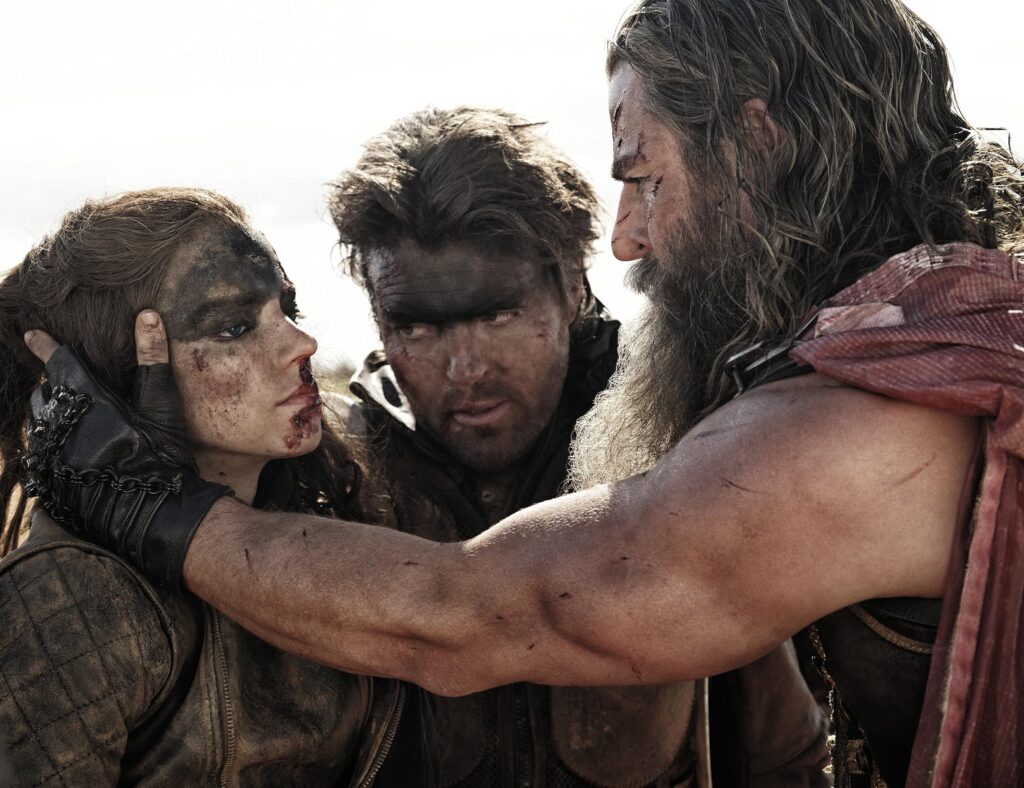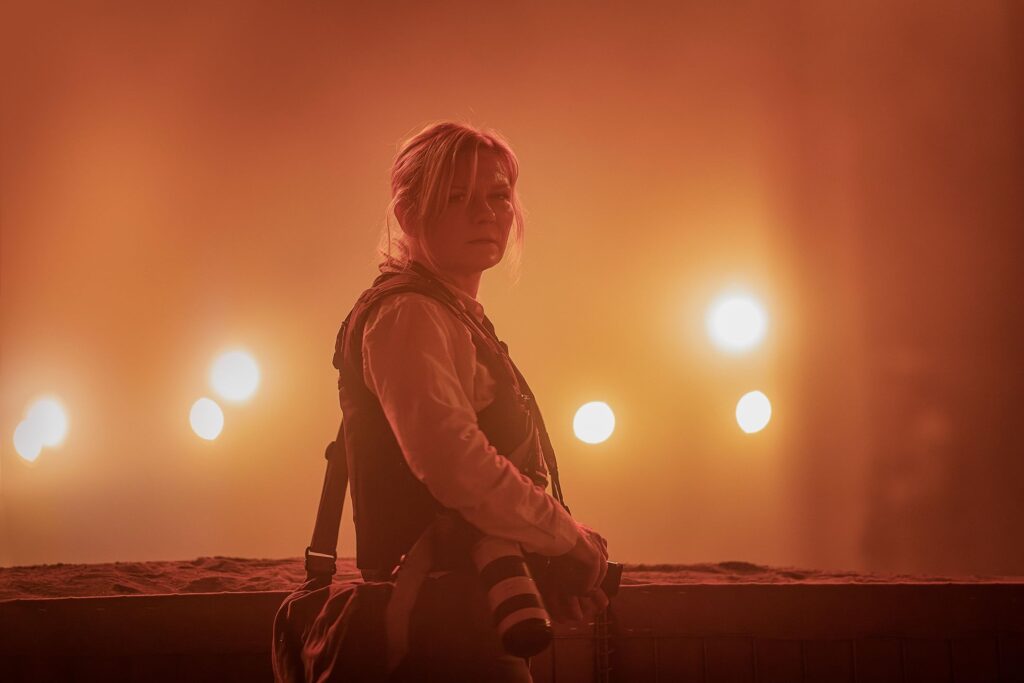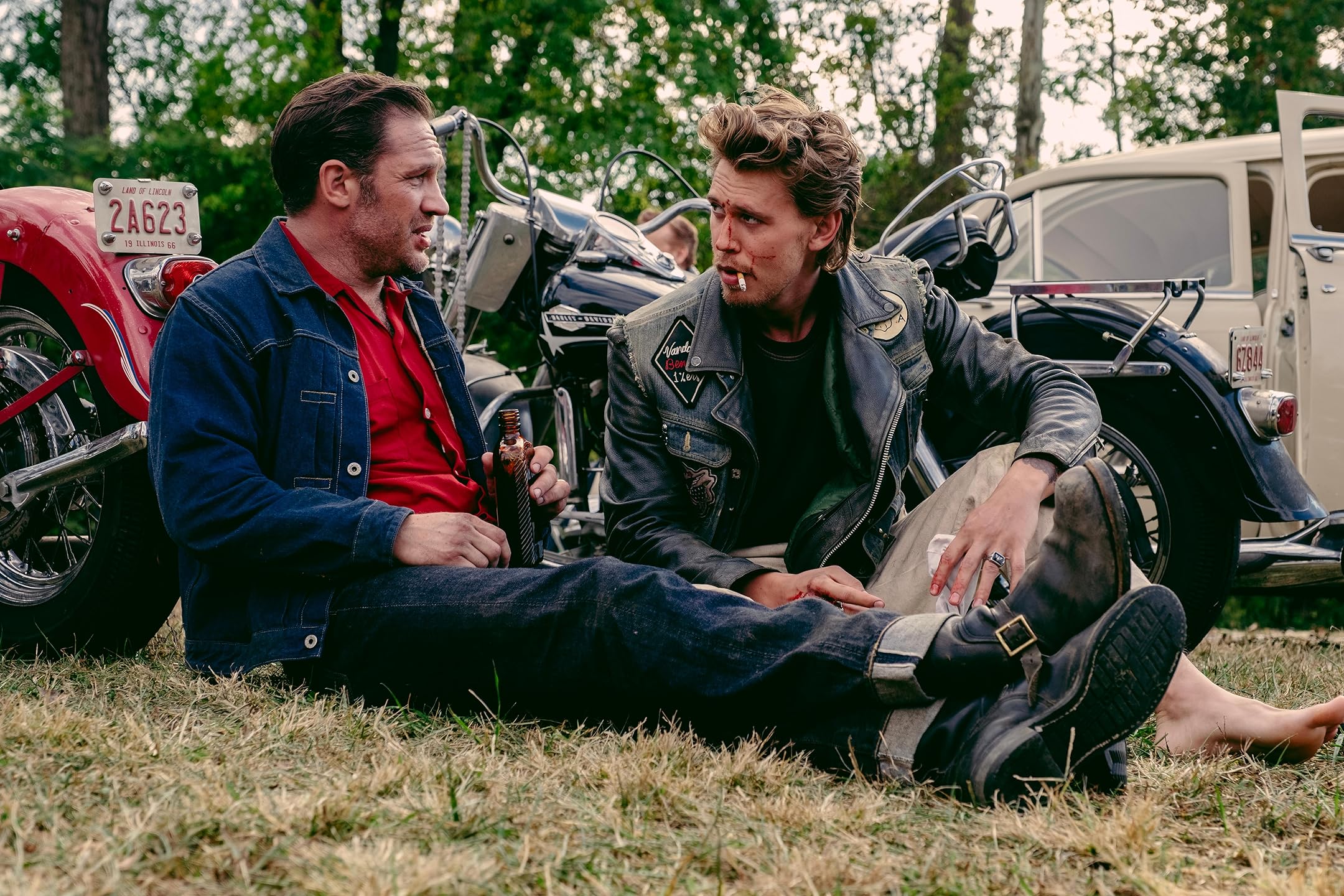Previous Articles In the Series
The 50 Best Films of 2024 in the UK: 50 – 41
The 50 Best Films of 2024 in the UK: 40 – 31
The 50 Best Films of 2024 in the UK: 30 – 21
20 – The Bikeriders
One of the big surprises of last summer for me was The Bikeriders. Over the first half of 2024, I must have sat through the trailer for Jeff Nichols’ latest movie every time I went to the cinema. Based on its trailer, I thought The Bikeriders would be a generic film about a biker gang. So I was pleasantly surprised to discover it was a much more thoughtful movie than its trailer would have you believe.
The Bikeriders tells the true story of the Chicago-based Vandals Motorcycle Club between 1965 and 1975. The film tells the events from the perspective of Kathy Bauer (Jodie Comer), a woman whose husband Benny (Austin Butler) was a gang member. Kathy provides her account of events through a series of interviews. Viewers learn the gang was founded by Johnny Davis (Tom Hardy). Johnny forms the club after seeing Marlon Brando in The Wild One. Initially, the club was just a way for men to socialise. The size of the Vandals grows over time as more rival gangs slowly integrate themselves into the group. This leads to the Vandals increasingly becoming involved in criminal activity.
I felt The Bikeriders was a film of two halves. I enjoyed the first half covering how Johnny and Beny first meet, and how their friendship blossoms. There’s an intensity to the friendship between Benny and Johnny that borders on the homoerotic at times. Tom Hardy and Austin Butler exude machismo and they trade mouldering glances at each other throughout the movie. Sadly I was less enthusiastic about The Bikeriders’ second act. This half of the film documents the group’s descent from being a humble biker gang into a criminal enterprise. Despite losing some momentum as it progresses, I still felt The Bikeriders was an excellent film.
19 – Evil Does Not Exist
Evil Does Not Exist is the follow-up to Japanese director Ryusuke Hamaguchi’s Oscar-winning movie Drive My Car. It is also one of the more interesting films of 2024.
Evil Does Not Exist is a modern-day eco-parable. It tells the story of Takumi Yasumura, a handyman living with his daughter in a picturesque Japanese village. A corporation submits plans to develop a glamping site in the village, which causes local residents to raise concerns. Takumi in particular expresses worries about the location of a sceptic tank that could contaminate the village’s water supply. The corporation sends two representatives to hear resident’s concerns, and are impressed by Takumi’s knowledge. They try to befriend him. Initially, this is a PR stunt to win over sceptical residents. However, as the film progresses, these employees seem to be slowly won over by the beauty of the village. This seeming damascene conversion sees them increasingly becoming disillusioned with their corporate jobs, and considering moving to the village.
As I mentioned earlier, Evil Does Not Exist is eco-parable about humankind’s constant conflict with nature. It also provides a cautionary tale about our desire to bend nature to our desires.

18 – Furiosa: A Mad Max Saga
A decade on from Mad Max: Fury Road, Australian director George Miller returned with Furiosa: A Mad Max Saga. In the film (which we’ll refer to as just Furiousa going forward), Anya Taylor-Joy takes up the aforementioned role of Furiosa from Charlize Theron. Taking place over the space of 20+ years, Furiosa serves as an origin story for the character. It also acts as a direct prequel to Mad Max: Fury Road.
Despite really enjoying Furiosa, I have conflicting emotions about the film. Firstly it is a visually stunning film. With its hyper-saturated desert locales and large set pieces, Furiosa is a film best experienced on the largest screen possible. However, I did find that its saturated colour palette and stylized visuals meant it was also a film that looked incredibly artificial. This is in stark contrast to Mad Max: Fury Road, which managed to look both stylish and have a gritty realism to it as well.
My other issue with Furiosa was that its nearly three hours runtime felt excessive. It takes an hour or so of world-building before we are finally introduced to Anya Taylor-Joy as an adult. After that Furiosa effectively becomes a series of large set-pieces. I feel George Millar could have improved the film significantly by maybe cutting 20 minutes from the first hour to create a tighter, more compelling narrative.
17 – Inside Out 2
The sole animated film on this year’s list is Inside Out 2. Released almost a decade after its predecessor, Inside Out 2 picks up shortly after the conclusion of the first film. Riley is now a teenager entering high school. She (along with her long-term friends) are invited to try out for the High School hockey team.
After a run of fairly middling releases e.g. Onward, Elemental, etc, Inside Out 2 was a return to form for Pixar. I felt Inside Out 2 did a great job capturing the complex emotional struggles of becoming a teenager. While the raft of new characters representing more nuanced emotions may not be as instantly relatable as Joy or Sadness, they’re still great nonetheless. Maya Hawke in particular is brilliant as Anxiety, portraying the role as a manic and chaotic whirlwind of energy. Inside Out 2 also features a tremendous recurring joke (which I won’t spoil) involving nostalgia.
16 – All We Imagine As Light
All We Imagine As Light is the fiction debut of documentary filmmaker Payal Kapadia. Set in Mumbai, it follows the lives of three women at different stages of their lives. The first of these characters is middle-aged nurse Prabha (Kani Kusruti). Prabha’s husband is an economic migrant who has travelled to Germany but has failed to maintain contact with her for over a year. Prabha shares her apartment with Anu (Divya Prabha), a free-spirited nurse in her 20s involved in a secret relationship with a Muslim boy. Finally, there is Parvaty (Chhaya Kadam): an older woman facing eviction from her building under the grounds of health and safety.
Fans of Past Lives and All of Us Strangers will almost certainly love All We Imagine As Light. Like these two movies, All We Imagine As Light is a film that is at its best when showcasing its cast giving performances in the minor key. In that sense, All We Imagine As Light is a film that focuses more on the unspoken than on explicit dialogue.
Many of the best scenes involve Kani Kusruti, who is a revelation as the sensible Prabha. One such scene occurs around the halfway point of the movie, where a male doctor Prabha has grown close to during the first half of the movie announces he is considering moving away. From the long awkward silences throughout this conversation, viewers can ascertain that the doctor is looking for Prabha to tell him to stay. However, she clearly feels confined by societal pressures to play the role of the dutiful wife.
The other major strength of All We Imagine As Light is its beautiful cinematography. There’s an intimate and naturalistic look to Ranabir Das’ cinematography, which means the film looks more like a documentary rather than a drama. The cinematography also makes tremendous use of the Mumbai skyline. Throughout the film, Payal Kapadia frequently shows us glimpses of the city’s tower blocks partially lit up. These cityscapes are also usually accompanied by a monologue from Prabha. These sequences have an almost dream-like quality to them, and also perfectly capture the idea of feeling lost and isolated in a gigantic city.
15 – Perfect Days
Perfect Days is the latest film from legendary director Wim Wenders. It is also the most chill movie of the year! Perfect Days follows the day-to-day life of Japanese toilet cleaner Hirayama (Kôji Yakusho), as he travels around the city cleaning its various public toilets. Hirayama follows a very structured daily routine: he gets up at dawn, and picks out an audio cassette from his collection, before performing his daily duties. What little free time he does have, Hiryama seems to spend reading books and enjoying nature. It’s a very simplistic lifestyle and one that seems to bring him great joy.
Despite this seemingly idyllic lifestyle, there does seem to be a degree of melancholia to his lifestyle. This is hinted at during the latter half of Perfect Days with the arrival of Aya, Hirayama’s niece. Aya has run away from home, and her arrival leads to a confrontation between Hirayam and his seemingly estranged sister Keiko.
Perfect Days is a brilliant return to form for Wim Wenders. It is a film which deftly manages to juggle comedic elements, as well as moments of great sadness and introspection. It also features a stunning lead performance from Kôji Yakusho as Hirayama. Kôji Yakusho has a brilliantly expressive face that allows you to know exactly what thoughts and emotions he is experiencing at that moment. Most importantly, Perfect Days is a film that inspires oneself to take comfort in the simple things in life, even if it is just the joy of listening to your favourite cassette tape for the one-thousandth time!

14 – The Iron Claw
The Iron Claw was one of my most anticipated films of the year. The latest movie from director Sean Baker, The Iron Claw is a biopic based on the lives of the Von Erich family of professional wrestlers. The film starts with a prologue sequence set in 1965. Wrestler Fritz Von Erich (Holt McCanally) is walking out of the Dallas Sportatorium venue, having unsuccessfully challenged for the NWA Worlds Heavyweight Title. The movie then jumps forward in time to 1979. By this point in time, Fritz has now retired from in-ring competition, and has become a successful wrestling promoter. His promotions’ top stars are his four sons: Kevin (Zac Effron), Kerry (Jeremy Allen White), David (Harris Dickinson), and Mike (Stanley Simons). The Iron Claw follows the lives of the Von Erich over a 10+ year period fraught with tragedy, and toxic masculinity.
In my opinion, The Iron Claw is easily one of the most underrated films of the year. Like most biopics, it contains several historical inaccuracies. The most notable of these is the omission of a sixth Von Erich brother – Chris – who committed suicide in 1991. Despite these minor historical inaccuracies, I felt The Iron Claw was a powerful commentary on the destructiveness of toxic masculinity and male ego. It is also a film that counters this bleakness by showing the value of brotherhood. The Iron Claw also isn’t afraid to say it’s OK for men to be more open and emotionally vulnerable. And in the age of influencers such as Andrew Tate, that is an important message for young men.
13 – Slow
Slow is a Lithuanian romantic drama directed by Marija Kavtaradzė. It follows the lives of dancer Elena (Greta Grinevičiūtė) and interpreter Dovydas (Kęstutis Cicėnas). The pair start a romantic relationship and seemingly have an idyllic life. However, Dovydas’ revelation that he is asexual puts their young relationship to the test.
I felt that Slow was one of the more fascinating and moving films of 2024. Greta Grinevičiūtė and Kęstutis Cicėnas are both brilliant as Elena and Dovydas, and you can easily buy into the idea of them being partners. The performances in Slow, along with Laurynas Bareisa’ds cinematography, give the film a wonderful naturalistic feeling. I also thought that Marija Kavtaradzė’s script did an excellent job exploring the concept of asexuality in a complex and sensitive manner. All these facets seamlessly work together to make Slow one of the most emotionally satisfying films of the year.
12 – Hoard
Hoard is the feature film debut from British director Luna Carmoon. The film starts with a prologue sequence set in the 1980s which introduces viewers to a young girl called Maria, and her mother Cynthia (Hayley Squires). Maria and Cynthia live in squalor, a situation exacerbated by the fact that Cynthia is experiencing a mental health crisis. Her obsessive-compulsive order causes her to compulsively hoard items people have thrown away.
The movie jumps forward in time a decade or so. We discover Maria (now played by Saura Lightfoot Leon) is a teenager living a settled life in foster care. After finishing school Maria feels directionless and lonely. This feeling of isolation is made worse when her best friend is sent away by her religious father. Another former foster child – Michael (Josepth Quinn) – comes to visit Maria’s foster mother. Michael’s arrival at the household causes Maria to revert to an almost feral state, as she and Michael form a toxic bond.
Hoard is a daring and at times uncomfortable film to watch. Saura Lighfoot Leon and Joseph Quinn in particular are brilliant as Maria and Michael. The dynamic between these two characters is fascinating to watch, as they both seem to form a parasocial relationship with each other. This causes Michael and Maria to revisit the trauma of their childhoods, acting out in increasingly disturbing ways.

11 – Civil War
Released in the Spring of this year, Civil War is arguably the most prescient of films shown in cinemas this year. Written and directed by Alex Garland, Civil War takes place in a dystopian and authoritarian United States of America, where the President (Nick Offerman) has declared martial law and stayed in position long past the term limits of the position. The film follows three journalists: photojournalist Lee Smith (Kirsten Dunst), Reuters reporter Joel (Wagner Moura), and veteran journalist Sammy (Stephen McKinley Henderson). After surviving a suicide bombing, the trio decides to travel to Washington with the hope of interviewing the President. A young photographer named Jessie (Cailee Spaeny) joins them on this treacherous journey.
Civil War was a powerful and thought-provoking piece of cinema. While it may be hard for some viewers to imagine a scenario in which the events of the film occur, I nonetheless thought it provided an invaluable insight into the likely outcome of Western democracies sliding further into authoritarianism.
It also provided viewers with a chilling reminder of what can happen when humanity abandons compassion and empathy for others. This is best demonstrated in a scene about halfway through Civil War. In this scene, the group encounters a militia group that holds them at gunpoint. Their leader (played by a terrifying Jesse Plemons), interrogates two Asian-American journalists who have joined our protagonists on their journey. The militia leader callously executes both journalists for not being “American,” despite their protest that they are not Chinese spies. This scene is unbelievably tens and is more terrifying than anything you’ll see in a horror movie this year!
